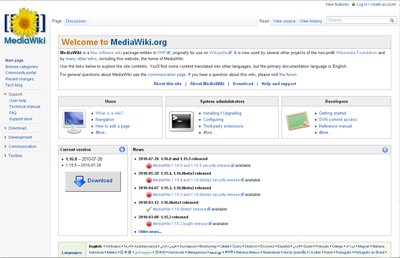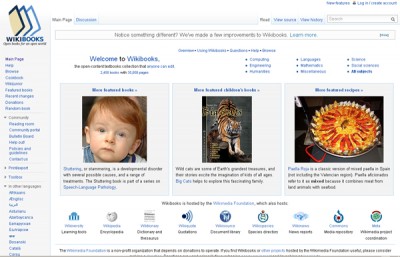Wikis are simple software packages that allow people to co-edit information and to make that information sharable, either within a password-protected space or a wholly public one. A “wiki” means “fast” in Hawaiian and was used by Ward Cunningham for this type of software. Cunningham was the originator of a wiki back in 1995 (see Wikipedia’s WikiWikiWeb entry).
The power of wikis
The power of a wiki resides in being able to evolve a knowledge structure that changes based on the available information. The interlinked pages, the search functions, and the “random page” generator enables people to find what they need but also to interact with the contents in serendipitous ways.
Wikis are also unusual in that they allow virtually anyone to edit the contents (although the access may be limited to those who have to pass through an authentication layer if password protection is required). Many wikis contain the broad range of mainstream multimedia: text, imagery, links to videos and audio files, and simulations.
MediaWiki
A well-known open-source software is MediaWiki, most well-known for being the underlying wiki structure for Wikipedia (www.wikipedia.org), which is available in a number of languages.
This software is free, with evolving plug-ins (created by developers who donate their time and talents to this open-source product) that enable additional functionalities. This software has to be installed on a university’s own servers.
This is not a third-party-hosted solution like so-called “wikifarms,” which are on others’ servers, are guided by End User License Agreements (EULAs) concerning uploaded contents, and may involve copyright considerations.
Wikimasters
The culture of public and open wikis is decided in part by whomever hosts and runs the wiki. Some are purely to document developer notes for co-evolved code, for example. Others are used for public collaborations around a particular project. Immersive MMORPGs (Massively Multiplayer Online Role-Playing Games) have wikis set up to address play strategy.
Another unique aspect of a wiki involves the administrative power to reverse edits on pages (particularly those that have been spammed).
Administrators may also block access by Internet Protocol (IP) addresses if users from those addresses abuse their user rights in terms of what they post.
WikiBooks
One example of a site built on a MediaWiki understructure is WikiBooks.
The following is a screenshot of a Wikimedia Cookbook.
Various books may also be viewed in HTML form but also downloaded as PDFs or printed in paper form. The following is a screenshot of the Cognitive Psychology and Cognitive Neuroscience WikiBook.
The following is a screenshot of the PDF version of “Cognitive Psychology and Cognitive Neuroscience”.
One of the projects at K-State that uses the MediaWiki software includes the E-Learning and Teaching Exchange Wiki (ELATE), which is moderated by wikimaster Roger McHaney, professor of Management in the College of Business Administration.




